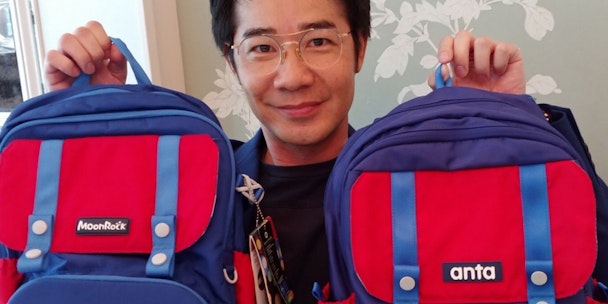Chinese sportswear giant Anta faces IP copyright charges in China
Chinese sportswear giant Anta Sports Products has been sued for producing similar-looking schoolbags made by a Hong Kong-based company.

The sportswear giant was an apparel sponsor of the Chinese Olympic team in 2016. Photo: SCMP.
Anta has been hit with three different lawsuits in Shanghai, Guangzhou and Shenzhen by Grown Up Licenses for infringing the copyright by copying the appearance of three of Grown Up’s distinctive red and blue schoolbags.
The sportswear giant, which was an apparel sponsor of the Chinese Olympic team in 2016, has since stopped selling the bags and offered to buy some products from Grown Up as compensation, according to The South China Morning Post.
“Usually it is the small company copying the designs of a large firm. There are already some people who think we have copied the design from Anta, but we have all the evidence to prove that it is the other way around,” said Alvin Ip Tze-fai, chief executive of Grown Up.
“It is not just about money, it is more about our reputation. We are surprised to see a big company like Anta copying our design.”
The bags, which have been on sale since 2017, have earned recognition from the American Chiropractic Association for protecting the backs' of school-going children and have since been patented.
The MoonRock-branded schoolbags sport a price tag of between 700 yuan (US$104.5) and 800 yuan on the mainland, while the similar bags offered by Anta are sold at 200 to 300 yuan.
In recent years, the Chinese government has become pro-patent as they feel that intellectual property protection is key to the success of the country’s homegrown global brands.
Danish toymaker Lego succeeded in its first copyright competition case in China in 2017 when the Shantou Intermediate People’s Court ruled in its favor after it found two Chinese companies copying the packaging and logos of Lego products.
The next year, the brand won another case when a court ruled that four companies had “infringed multiple copyrights of the Lego Group and conducted acts of unfair competition by producing and distributing Lepin building sets”.
More recently, Supreme New York sought legal support from the Chinese government in its trademark infringement action against Supreme Italia, a counterfeit business in China after the latter opened a physical store in Shanghai.

